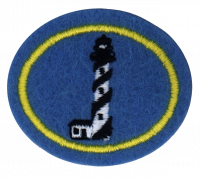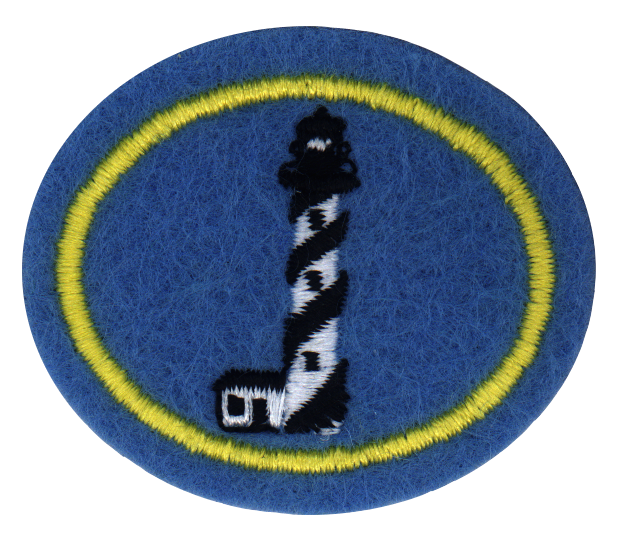Difference between revisions of "AY Honors/Lighthouses/Answer Key/es"
From Pathfinder Wiki
< AY Honors | LighthousesAY Honors/Lighthouses/Answer Key/es
(Created page with "{{clear}}") |
|||
| (9 intermediate revisions by 2 users not shown) | |||
| Line 51: | Line 51: | ||
<!-- 4. ¿Están todos los faros situados a lo largo de las costas del océano? Si no, hacer una lista de otros lugares donde se encuentra un faro. --> | <!-- 4. ¿Están todos los faros situados a lo largo de las costas del océano? Si no, hacer una lista de otros lugares donde se encuentra un faro. --> | ||
| − | + | {{clear}} | |
| − | |||
| − | |||
<noinclude></noinclude> | <noinclude></noinclude> | ||
| Line 61: | Line 59: | ||
<!-- 5. ¿Cómo se llama el servicio de los faros en su país? ¿Qué organización o rama del gobierno es responsable de mantener los faros en su país? --> | <!-- 5. ¿Cómo se llama el servicio de los faros en su país? ¿Qué organización o rama del gobierno es responsable de mantener los faros en su país? --> | ||
| − | + | {{clear}} | |
| − | |||
| − | |||
| − | + | {{clear}} | |
| − | |||
| − | |||
| − | |||
| − | |||
| − | |||
| − | |||
| − | |||
<noinclude></noinclude> | <noinclude></noinclude> | ||
| Line 86: | Line 75: | ||
<!-- 7. ¿Qué es una sirena de niebla? ¿Por qué una debería ser utilizada en un faro? ¿Qué son tres cosas que afectan cuán lejos se puede escuchar una sirena de niebla? --> | <!-- 7. ¿Qué es una sirena de niebla? ¿Por qué una debería ser utilizada en un faro? ¿Qué son tres cosas que afectan cuán lejos se puede escuchar una sirena de niebla? --> | ||
| − | + | {{clear}} | |
| − | |||
| − | |||
| − | + | {{clear}} | |
| − | |||
| − | |||
| − | + | {{clear}} | |
| − | |||
| − | |||
<noinclude></noinclude> | <noinclude></noinclude> | ||
| Line 107: | Line 90: | ||
<noinclude></noinclude> | <noinclude></noinclude> | ||
| − | + | {{clear}} | |
| − | |||
| − | |||
| − | + | {{clear}} | |
| − | |||
| − | |||
<noinclude></noinclude> | <noinclude></noinclude> | ||
| Line 139: | Line 118: | ||
{{CloseReq}} <!-- 8 --> | {{CloseReq}} <!-- 8 --> | ||
{{ansreq|page={{#titleparts:{{PAGENAME}}|2|1}}|num=9}} | {{ansreq|page={{#titleparts:{{PAGENAME}}|2|1}}|num=9}} | ||
| − | <noinclude> | + | <noinclude></noinclude> |
| − | </noinclude> | + | <!-- 9. Escribir un poema o una historia sobre una luz de un faro. Incluir pensamientos de la luz de Dios. Leer esta historia o poema a un grupo. --> |
| − | <!-- 9. | ||
| − | |||
| − | |||
{{Bible_verse | {{Bible_verse | ||
| Line 159: | Line 135: | ||
}} | }} | ||
| − | + | {{clear}} | |
| − | |||
| − | |||
| − | + | {{clear}} | |
| − | |||
| − | |||
| − | + | {{clear}} | |
| − | |||
| − | |||
| − | |||
| − | |||
<noinclude></noinclude> | <noinclude></noinclude> | ||
| Line 181: | Line 149: | ||
{{clear}} | {{clear}} | ||
| − | + | {{clear}} | |
| − | {{ | + | |
| − | + | {{clear}} | |
| − | |||
| − | |||
| − | |||
| − | }} | ||
| − | |||
| − | + | {{clear}} | |
| − | {{ | ||
| − | |||
| − | |||
| − | |||
| − | |||
| − | }} | ||
| − | |||
| − | + | {{clear}} | |
| − | {{ | ||
| − | |||
| − | |||
| − | |||
| − | |||
| − | }} | ||
| − | |||
| − | + | {{clear}} | |
| − | {{ | ||
| − | |||
| − | |||
| − | |||
| − | |||
| − | }} | ||
| − | |||
| − | + | {{clear}} | |
| − | {{ | ||
| − | |||
| − | |||
| − | |||
| − | |||
| − | }} | ||
| − | |||
| − | + | <noinclude></noinclude> | |
| − | <noinclude | ||
| − | |||
{{CloseReq}} <!-- 10 --> | {{CloseReq}} <!-- 10 --> | ||
{{ansreq|page={{#titleparts:{{PAGENAME}}|2|1}}|num=11}} | {{ansreq|page={{#titleparts:{{PAGENAME}}|2|1}}|num=11}} | ||
| − | <noinclude> | + | <noinclude></noinclude> |
| − | </noinclude> | + | <!-- 11. Realizar una de las siguientes actividades: --> |
| − | <!-- 11. | ||
| − | |||
| − | + | {{clear}} | |
| − | |||
| − | |||
| − | + | {{clear}} | |
| − | |||
| − | |||
| − | + | {{clear}} | |
| − | |||
| − | |||
| − | + | {{clear}} | |
| − | |||
| − | |||
| − | + | {{clear}} | |
| − | |||
| − | |||
| − | + | <noinclude></noinclude> | |
| − | <noinclude | ||
| − | |||
{{CloseReq}} <!-- 11 --> | {{CloseReq}} <!-- 11 --> | ||
{{ansreq|page={{#titleparts:{{PAGENAME}}|2|1}}|num=12}} | {{ansreq|page={{#titleparts:{{PAGENAME}}|2|1}}|num=12}} | ||
| − | <noinclude> | + | <noinclude></noinclude> |
| − | </noinclude> | + | <!-- 12. Hacer una lista de las referencias que se utilizaron para aprender acerca de los faros. --> |
| − | <!-- 12. | ||
| − | |||
| − | + | {{clear}} | |
| − | |||
| − | |||
| − | + | {{clear}} | |
| − | |||
| − | |||
| − | + | {{clear}} | |
| − | |||
| − | |||
| − | + | {{clear}} | |
| − | |||
| − | |||
| − | + | <noinclude></noinclude> | |
| − | |||
| − | |||
| − | <noinclude | ||
| − | |||
{{CloseReq}} <!-- 12 --> | {{CloseReq}} <!-- 12 --> | ||
{{CloseHonorPage}} | {{CloseHonorPage}} | ||
Latest revision as of 00:43, 26 July 2022
1
Describir en detalle lo siguiente sobre los faros:
1a
¿Cuál es la función de un faro?
1b
¿Cuándo fueron construidos los primeros faros de registro?
1c
¿Cuál es el nombre del faro antiguo más famoso?
1d
¿Cómo se llaman las personas que estudian los faros? ¿Por qué?
1e
¿Todos los faros tienen personas que los mantienen? Si no, ¿cómo funcionan?
2
Investigar la estructura y la función de los lentes de Fresnel. Explicar qué hace estos lentes tan eficaces.
3
A lo largo de la historia, ¿qué combustibles se utilizaban para las luces del faro?
4
¿Están todos los faros situados a lo largo de las costas del océano? Si no, hacer una lista de otros lugares donde se encuentra un faro.
5
¿Cómo se llama el servicio de los faros en su país? ¿Qué organización o rama del gobierno es responsable de mantener los faros en su país?
6
Cuando un faro es visible desde el océano durante el día, se puede identificar por ciertas marcas. ¿Cómo se llaman estas marcas?
7
¿Qué es una sirena de niebla? ¿Por qué una debería ser utilizada en un faro? ¿Qué son tres cosas que afectan cuán lejos se puede escuchar una sirena de niebla?
8
Dado que los faros son llamados a menudo «luces», explorar el concepto de «luces» en las Escrituras de la manera siguiente:
8a
Buscar en una concordancia bíblica «luces» y discutir sobre las luces que son mencionadas en la Biblia.
8b
Explicar por qué la Palabra de Dios es como un faro.
8c
Memorizar Juan 8:12.
Otra vez Jesús les habló, diciendo: —Yo soy la luz del mundo; el que me sigue no andará en tinieblas, sino que tendrá la luz de la vida.
9
Escribir un poema o una historia sobre una luz de un faro. Incluir pensamientos de la luz de Dios. Leer esta historia o poema a un grupo.
- 7 al que hizo las grandes lumbreras,
- porque para siempre es su misericordia:
- 8 el sol para que señoree en el día,
- porque para siempre es su misericordia;
- 9 la luna y las estrellas para que señoreen en la noche,
- porque para siempre es su misericordia.
10
Dibujar o fotografiar cinco formas de faros y tipos que se utilizan en la actualidad.
11
Realizar una de las siguientes actividades:
- a. Hacer una lista de los nombres y los lugares de cinco faros en su estado o provincia.
- b. Localizar en el mapa la ubicación de diez faros en su país/provincia.
12
Hacer una lista de las referencias que se utilizaron para aprender acerca de los faros.


